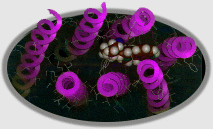Acid on the Brain
LSD is perhaps one of the most interesting drugs to examine. It is an intensely powerful psychedelic which causes users to suddenly throw free the filtering mechanisms that the human brain uses in day-to-day life to manage the huge amount of sensory input to which it is constantly exposed. This can lead to a powerful realizations and new understandings about the user's life and the world around them. Sometimes that experience is a wonderful, mind-expanding journey. Occasionally, users can find the experience somewhat scary, and if not handled properly, can lead to full-on paranoia until the drug has worn off. In either case, LSD has no long-term physical side effects.
A Long and Tumultuous History
Pioneered by consciousness visionaries such as Timothy Leary in the sixties and seventies, LSD was administered to an estimated 40,000 patients and found to a highly effective treatment for a number of mental disorders including alcoholism and obsessive compulsive disorder. Unfortunately, the drug's effects varied dramatically, depending on the personality of the user. No consensus was reached in the medical community regarding its application. In the meantime, millions of hippies were experimenting with the drug outside of the labratory.
Leary went before Congress in 1967 to ask that LSD be regulated, like alcohol. As a proponent of LSD, he was concerned that most LSD available for purchase was of substandard quality, and impurities in the product could lead to potential dangers for users. Congress responded with their usual thoughtful consideration by making LSD illegal.
A Tool of the Mind
 LSD is a powerful drug that should not be treated lightly. It is not, however, physically harmful in any way. Nor is it addictive. In fact, a single LSD trip builds an instant tolerance in the body; taking LSD again within 3 days will cause only a very mild "buzz," nothing like a true acid trip. This makes it almost impossible to abuse, when compared to drugs that can be consumed continuously.
LSD is a powerful drug that should not be treated lightly. It is not, however, physically harmful in any way. Nor is it addictive. In fact, a single LSD trip builds an instant tolerance in the body; taking LSD again within 3 days will cause only a very mild "buzz," nothing like a true acid trip. This makes it almost impossible to abuse, when compared to drugs that can be consumed continuously.
Many psychedelics from the sixties, such as ibogaine and MDA, have declined in popularity since that time. LSD, however, has remained in common use. It is such a powerful tool for personal growth that users continue to seek it out, and manufacturers continue to create it, despite potentially great legal repercussions. (Sentencing for illegal substance creation, possession, or sale is usually based on weight. LSD is incredibly potent, with an average dose being around 200 micrograms. That's 1/5000th of a gram!)
Unfortunately, LSD's great power as a tool of the mind is also what will cause it to be one of the last drugs to be legalized.
|

